
Thomas Michael Keneally, AO is an Australian novelist, playwright, essayist, and actor. He is best known for his non-fiction novel Schindler's Ark, the story of Oskar Schindler's rescue of Jews during the Holocaust, which won the Booker Prize in 1982. The book would later be adapted into Steven Spielberg's 1993 film Schindler's List, which won seven Academy Awards, including Best Picture.

Marcus Andrew Hislop ClarkeFRSA was an English-born Australian novelist, journalist, poet, editor, librarian, and playwright. He is best known for his 1874 novel For the Term of His Natural Life, about the convict system in Australia, and widely regarded as a classic of Australian literature. It has been adapted into many plays, films and a folk opera.
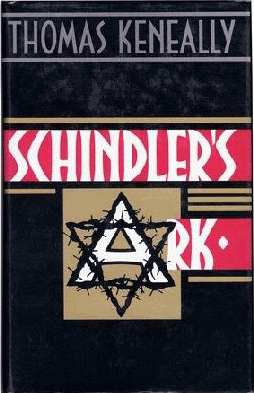
Schindler's Ark is a historical fiction published in 1982 by the Australian novelist Thomas Keneally. The United States edition of the book was titled Schindler's List; it was later reissued in Commonwealth countries under that name as well. The novel won the Booker Prize, a literary award conferred each year for the best single work of sustained fiction written in the English language, and was awarded the Los Angeles Times Book Prize for Fiction in 1983.
The Miles Franklin Literary Award is an annual literary prize awarded to "a novel which is of the highest literary merit and presents Australian life in any of its phases". The award was set up according to the will of Miles Franklin (1879–1954), who is best known for writing the Australian classic My Brilliant Career (1901). She bequeathed her estate to fund this award. As of 2016, the award is valued at A$60,000.

Australian literature is the written or literary work produced in the area or by the people of the Commonwealth of Australia and its preceding colonies. During its early Western history, Australia was a collection of British colonies; as such, its recognised literary tradition begins with and is linked to the broader tradition of English literature. However, the narrative art of Australian writers has, since 1788, introduced the character of a new continent into literature—exploring such themes as Aboriginality, mateship, egalitarianism, democracy, national identity, migration, Australia's unique location and geography, the complexities of urban living, and "the beauty and the terror" of life in the Australian bush.

Mary Reibey née Haydock was an English-born merchant, shipowner and trader who was transported to Australia as a convict. After gaining her freedom, she was viewed by her contemporaries as a community role model and became legendary as a successful businesswoman in the colony.
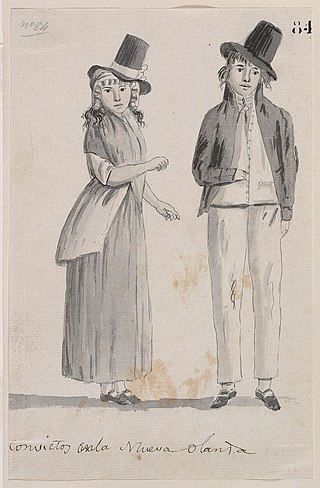
Between 1788 and 1868 the British penal system transported about 162,000 convicts from Great Britain and Ireland to various penal colonies in Australia.
B. Wongar is a Serbian-Australian writer. For most of his literary career, the concern of his writing has been, almost exclusively, the condition of Aboriginal people in Australia. His 1978 short story collection, The Track to Bralgu, was released to critical acclaim by the foreign press, who were led to believe by publisher Little Brown that Wongar was of Aboriginal ethnicity. The revelation that Wongar was a Serbian immigrant, as well as inconsistencies in his life story, have led to controversy and allegations of literary hoax and cultural appropriation.

The Playmaker is a 1987 novel based in Australia written by the Australian author Thomas Keneally.
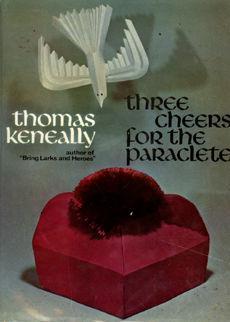
Three Cheers for the Paraclete (1968) is a novel by the Australian author Thomas Keneally. It won the Miles Franklin Award in 1968.

Confederates is a 1979 novel by the Australian author Thomas Keneally which uses the American Civil War as its main subject matter.
The Colin Roderick Award is presented annually by the Foundation for Australian Literary Studies at Queensland's James Cook University for "the best book published in Australia which deals with any aspect of Australian life". It was first presented in 1967 and now has a prize of A$50,000. Starting in 1980, the H. T. Priestley Memorial Medal has also been bestowed upon the award winner.
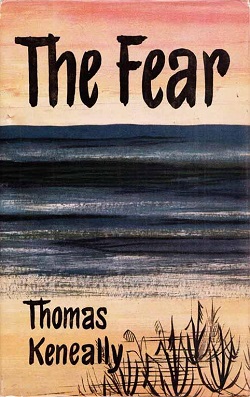
The Fear (1965) is a novel by Australian writer Thomas Keneally. The novel is also known by the title By the Line.
This article presents a list of the historical events and publications of Australian literature during 1967.
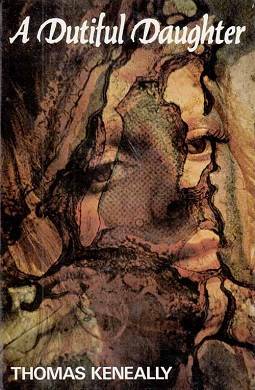
A Dutiful Daughter (1971) is a novel by Australian writer Thomas Keneally.
This article presents a list of the historical events and publications of Australian literature during 1972.

Flying Hero Class is a 1991 thriller novel by the Australian author Thomas Keneally.
Woman of the Inner Sea is a 1992 novel by the Australian author Thomas Keneally.
Jacko is a 1993 novel by the Australian author Thomas Keneally.
A River Town is a 1995 historical novel by the Australian author Thomas Keneally.












